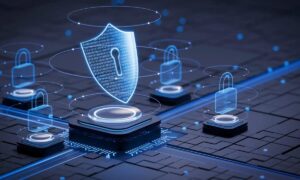The internet is a great thing, but it also brings with it certain risks. One of the biggest threats out there today is hackers. They can gain access to your personal information and even steal money or data. So how do you protect yourself against these malicious people? This guide aims to help you keep your computer safe from hackers and other online threats.
Install Security Software
One of the best ways to protect your computer from hackers is by installing security software. This type of program will detect any malicious activity on your computer and alert you to it. It will also help block viruses, spyware and other types of malware before they have a chance to damage your system. Make sure to keep your security software up-to-date so that it can provide maximum protection.
Use Strong Passwords
Another important step in protecting your computer from hackers is using strong passwords. A strong password should be at least 8 characters long and include a mix of upper and lowercase letters, numbers and special characters. Avoid using dictionary words, names or other items that can easily be guessed. Change your passwords regularly for added security.
Enable Multi-Factor Authentication
Multi-factor authentication adds an extra layer of security to your accounts by requiring you to enter two pieces of information instead of just one. For example, if you’re logging into an account, you may need to enter both your username and a one-time code sent to your phone. This helps ensure that no one else can gain access to your account even if they know your password.
Set Up a Firewall
A firewall is another way to protect your computer from hackers. It acts as a barrier between your computer and the internet, blocking any malicious traffic from entering your system. Most operating systems come with built-in firewalls, but you can also try third-party solutions for additional protection.
Secure Your Network
If you’re connecting to the internet via a wireless network, make sure that it is secure. Use WPA2 encryption if possible, as this offers the most protection. In addition, configure your router’s settings to disallow unauthorized access. You should also periodically check to see if anyone is attempting to hack into your network.
Be Careful What You Download
Even if you take all of the necessary precautions to protect your computer from hackers, you still need to be careful what you download. Never open attachments from unknown sources or click on links from suspicious emails. Additionally, only download programs from official sources, as downloads from other sites may contain malicious code.
Stay Alert
Finally, always stay alert when it comes to your online activities. Monitor your accounts for any unusual activity, such as strange logins or purchases. If you ever notice something suspicious, contact the website or service provider as soon as possible to investigate further.
By following these tips, you can greatly reduce the risk of your computer being hacked. Remember to keep your security software up-to-date, use strong passwords, enable multi-factor authentication, set up a firewall, secure your network, be careful what you download, and stay alert to any unusual activity.

































